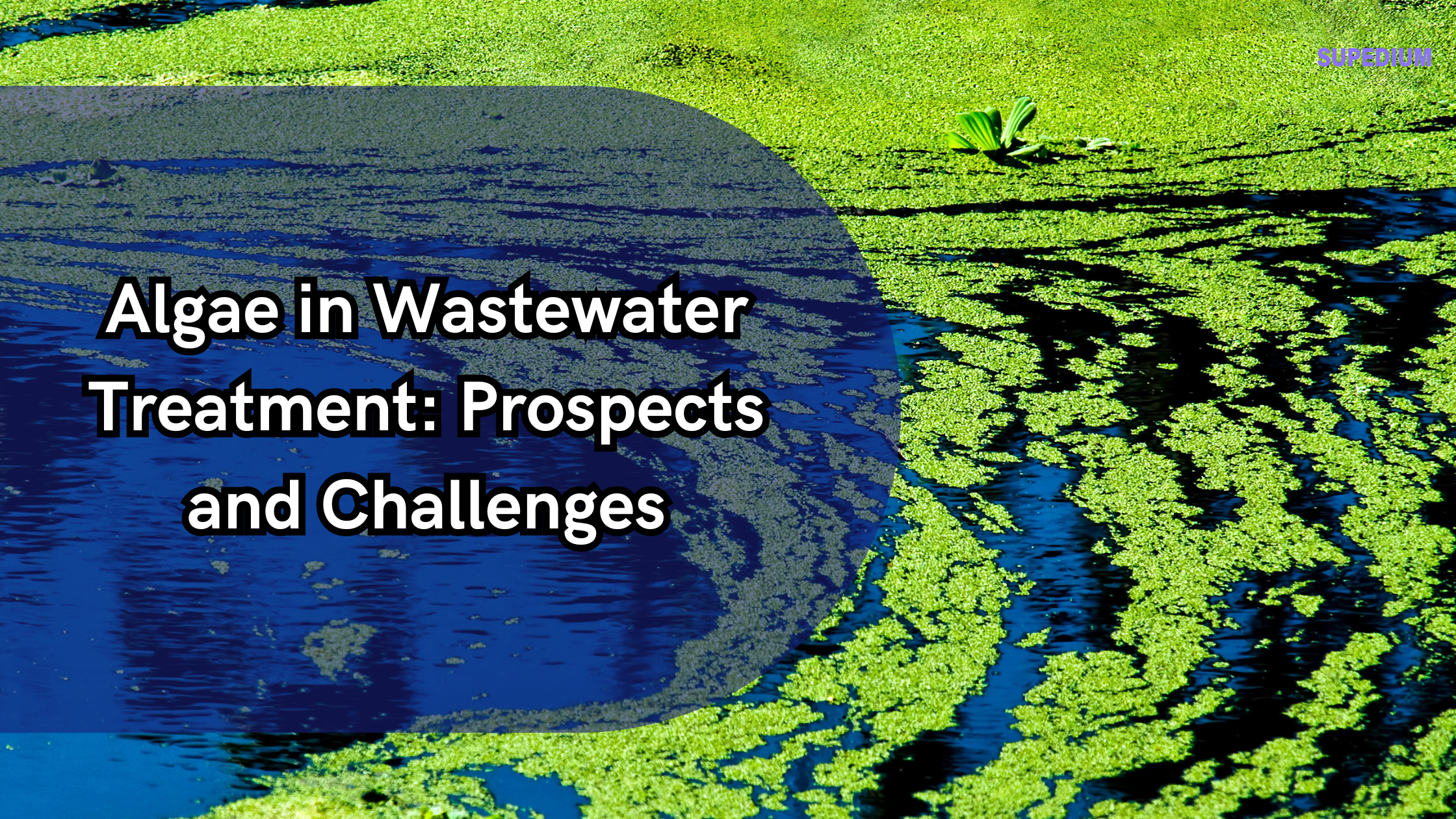Table of Contents
![]()
Introduction
Wastewater treatment is a critical component of environmental management, essential for protecting water resources and public health. As traditional methods of wastewater treatment face increasing scrutiny due to their high energy consumption and environmental impact, innovative and sustainable alternatives are gaining attention. One such promising solution is the use of algae in wastewater treatment. This article explores the potential of algae-based systems, their benefits, challenges, and future directions in the field.
Algae in Wastewater Treatment
Types of Algae Used
Algae are a diverse group of photosynthetic organisms that range from microscopic microalgae to larger macroalgae. In wastewater treatment, three main types of algae are employed:
- Microalgae: These include species like Chlorella and Spirulina. Microalgae are highly effective in nutrient removal and are often used in photobioreactors due to their high surface area to volume ratio.
- Macroalgae: Larger seaweeds such as kelp are used in various treatment systems. Macroalgae are particularly effective at absorbing nutrients and can be integrated into constructed wetlands.
- Cyanobacteria: Often referred to as blue-green algae, these organisms can fix atmospheric nitrogen and are utilized in systems where nutrient removal and additional nitrogen management are required.
Mechanisms of Algae in Wastewater Treatment
Algae contribute to wastewater treatment through several key mechanisms:
- Nutrient Removal: Algae assimilate nitrogen and phosphorus from wastewater, which are essential nutrients for their growth. This process helps mitigate nutrient pollution, a major cause of water body eutrophication.
- Organic Matter Degradation: Algae can break down organic matter in wastewater through metabolic processes, aiding in the reduction of biochemical oxygen demand (BOD).
- Oxygen Production: Through photosynthesis, algae release oxygen into the water, which supports aerobic microbial processes that further degrade organic pollutants.
Treatment Processes
Several algae-based treatment processes have been developed:
- Algal Ponds and Lagoons: These are large, shallow ponds where algae grow naturally. They are effective for nutrient removal and are often used in conjunction with other treatment methods.
- Algal-Bacterial Consortia: In these systems, algae and bacteria work together to treat wastewater. The algae provide oxygen through photosynthesis, while bacteria help decompose organic matter.
- Photobioreactors: These are closed systems designed to optimize algal growth conditions. They are typically used for high-value applications and offer controlled environments for efficient wastewater treatment.
- Integrated Systems: Algae-based constructed wetlands combine algae with natural wetland processes to treat wastewater. These systems are particularly suited for small-scale or decentralized applications.
Prospects of Algae-Based Wastewater Treatment
Environmental Benefits
Algae-based treatment systems offer several environmental advantages:
- Reduction in Nutrient Pollution: Algae effectively remove excess nutrients from wastewater, reducing the risk of eutrophication in receiving water bodies.
- Lower Energy Consumption: Compared to conventional methods such as activated sludge processes, algae-based systems require less energy for aeration and can even produce energy through biomass conversion.
- Carbon Dioxide Sequestration: Algae absorb CO2 during photosynthesis, contributing to greenhouse gas reduction and providing a potential carbon sink.
Economic Advantages
The economic potential of algae-based systems is notable:
- Resource Recovery: Algae biomass can be converted into valuable products such as biofuels, animal feed, and fertilizers, providing additional revenue streams and offsetting treatment costs.
- Cost-Effectiveness: Although initial capital costs may be high, long-term operational costs can be lower due to reduced energy needs and the potential for by-product sales.
Technological Innovations
Advancements in technology are enhancing the feasibility of algae-based treatment systems:
- Photobioreactor Design: Innovations in photobioreactor technology are improving efficiency, scalability, and cost-effectiveness of algae-based systems.
- Genetic Engineering: Development of genetically modified algae strains with enhanced nutrient uptake and biomass production is a promising area of research.
- Hybrid Systems: Combining algae with other treatment technologies, such as membrane bioreactors or electrochemical systems, can optimize performance and address specific treatment challenges.
Case Studies and Success Stories
Successful implementations of algae-based treatment systems provide valuable insights:
- Case Study 1: In Australia, algal ponds have been used effectively to treat wastewater from small communities, demonstrating the feasibility of this approach for decentralized systems.
- Case Study 2: A pilot project in the United States utilized photobioreactors for nutrient removal and biomass production, highlighting the potential for high-value applications and energy recovery.
Challenges and Limitations
Technical Challenges
Despite their potential, algae-based systems face several technical challenges:
- Scalability: Scaling up from laboratory or pilot-scale systems to full-scale operations can be complex and costly. Integration with existing infrastructure poses additional challenges.
- Control of Algae Growth: Managing algal growth to prevent issues such as clogging or overgrowth requires precise control of environmental conditions and nutrient levels.
- Handling and Disposal: Harvesting and processing algal biomass can be labor-intensive and require efficient methods to avoid operational inefficiencies.
Economic and Financial Challenges
Economic considerations are crucial for the widespread adoption of algae-based systems:
- Initial Investment: The capital costs associated with setting up algae-based treatment systems, including photobioreactors and supporting infrastructure, can be significant.
- Market Fluctuations: The economic viability of algae-based systems is influenced by market conditions for by-products, which can fluctuate based on demand and competition.
Environmental and Regulatory Issues
Regulatory and environmental factors also impact the implementation of algae-based systems:
- Algal Blooms: Excessive algal growth can lead to harmful algal blooms, which may affect local ecosystems and water quality if not managed properly.
- Regulatory Compliance: Meeting regulatory standards for wastewater treatment using algae requires careful design and monitoring to ensure compliance with environmental regulations.
Knowledge and Research Gaps
Ongoing research is needed to address existing knowledge gaps:
- Long-Term Performance: More data is needed on the long-term performance and stability of algae-based treatment systems in various environmental conditions.
- Process Optimization: Further research is required to optimize treatment processes, including nutrient removal efficiency and biomass utilization.
Future Directions and Recommendations
Research Needs
To advance algae-based wastewater treatment, several research areas require attention:
- Strain Development: Developing algae strains with improved performance characteristics for specific treatment applications is a key area of focus.
- Process Optimization: Research into optimizing growth conditions, nutrient removal, and biomass processing will enhance the efficiency and viability of algae-based systems.
Policy and Regulation
Supporting the development of algae-based technologies requires:
- Policy Development: Governments should develop policies that promote research and commercialization of algae-based treatment systems, including incentives and funding opportunities.
- Regulatory Frameworks: Establishing clear regulatory standards for algae-based systems will facilitate their adoption and ensure environmental protection.
Industry and Academia Collaboration
Collaboration between industry, academia, and government is crucial for advancing algae-based technologies:
- Joint Initiatives: Partnerships between research institutions and industry stakeholders can drive innovation and address practical challenges in algae-based treatment systems.
- Funding and Support: Increased funding for research and pilot projects will support the development and commercialization of algae-based wastewater treatment technologies.
Public Awareness and Education
Promoting the benefits and challenges of algae-based treatment systems is essential:
- Awareness Campaigns: Public awareness campaigns can help increase understanding of the potential of algae-based technologies and foster support for their adoption.
- Educational Programs: Educational initiatives targeting students, professionals, and policymakers can promote knowledge and interest in algae-based wastewater treatment solutions.
Conclusion
Algae-based wastewater treatment represents a promising avenue for addressing the environmental and economic challenges associated with traditional methods. While the technology offers significant benefits, including nutrient removal, energy savings, and resource recovery, it also faces challenges related to scalability, cost, and regulatory compliance. Continued research, technological innovation, and collaboration among stakeholders are essential for overcoming these challenges and realizing the full potential of algae in wastewater treatment. By addressing these issues and fostering supportive policies, algae-based systems can contribute to more sustainable and effective wastewater management solutions in the future.
Share This





Be the first to comment